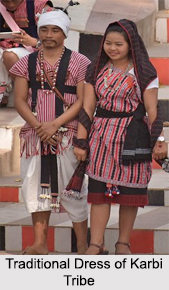 Karbis, the major tribal ethnic group of the Karbi Anglong district of Assam have their own traditional attire. The clothes they wear are homemade from the locally grown cotton or the Eri silk. In Karbi Anglong, it has been observed that the demand for traditional attire is still very high as it is being preferred by the old and the young alike. So Karbi women weavers continue producing the traditional clothes, keeping alive the colours and designs of ancient time and at the same time modernising them. One notable aspect of traditional dress of Karbi Tribe is that the different designs and colours of the clothes are meant for particular age, sex and social status of the people using them. The Karbi costumes more or less are similar to those of the Khasis of Meghalaya.
Karbis, the major tribal ethnic group of the Karbi Anglong district of Assam have their own traditional attire. The clothes they wear are homemade from the locally grown cotton or the Eri silk. In Karbi Anglong, it has been observed that the demand for traditional attire is still very high as it is being preferred by the old and the young alike. So Karbi women weavers continue producing the traditional clothes, keeping alive the colours and designs of ancient time and at the same time modernising them. One notable aspect of traditional dress of Karbi Tribe is that the different designs and colours of the clothes are meant for particular age, sex and social status of the people using them. The Karbi costumes more or less are similar to those of the Khasis of Meghalaya.
Traditional Dresses for Men of Karbi Tribe
Some of the traditional dresses of the Karbi men are as follows:
•The elderly male uses an artistically designed shirt called "Chaithangpo" and the young male uses a shirt called "Choi-Hongthor" or "Choi-Apong". It is a kind of warm jacket.
•In the remote places married and aged persons use a cloth known as "Rikong" which they wear while doing work.
•The use of turban called "Poho" is fast disappearing. Poho is a piece of colourful silk cloth which Karbi men use for making turban and wearing on their forehead.
•He also wears a dhoti of symmetrical designs and animal prints known as "Sator".
Traditional Dresses for Women of Karbi Tribe
Some of the traditional dresses of the Karbi women are as follows:
•The Karbi females use "Pinicamflak" as lower garment and "Pekok" as upper garment. The lower garment is a Karbi version of Assamese Mekhla but little shorter in length.
•They also use a highly artistic waistband called "Wamkok".
•In winter, they use coloured and striped scarf known as "Dokherso" while performances of “Chom-a-Kan†(death ceremony). It is their ritual for showing respect to their elders and also the dead ancestors.
•Karbi women use "Piba", a long cloth to carry their new born babies on the back.
These are some of the traditional attires and accessories of Karbi men and women inhabiting the Rongkhang area. Some have disappeared, some remained till today and used currently.
















